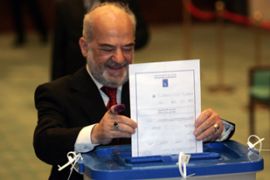Sadrists shun Iraq front-runners
Ex-prime minister Ibrahim al-Jaafari wins unofficial vote on who should be next PM.

Though bereft of any legal authority, the two-day referendum was held after al-Sadr emerged as a kingmaker following Iraq’s recently held national elections.
Zeina Khodr, Al Jazeera’s correspondent in Baghdad, said: “They [Sadrists] have made the announcement, their choice is Ibrahim al-Jaafari …
“The Sadrist movement said they would abide by the choice of the people, which means more political uncertainty.”
Big disappointment
The referendum results would contribute to more ambiguity to the Iraqi political scene.
The situation has been complicated as it is by the interpretation of the constitution regarding who should name the prime minister – the bloc which won more votes in the ballots or the one which govern the biggest number of seats in the parliament.
The results were a big disappointment for both Allawi and al-Maliki who wished to win the support of al-Sadr.
Final results in Iraq’s March 7 elections gave the Allawi-led Iraqiya just two seats more than State of Law bloc led by al-Maliki.
|
The Sadrists won at least 39 seats in the 325-seat parliament making them the largest group within the Iraqi National Alliance (INA), a mainly Shia Muslim coalition that placed third in the race.
Although the ballot was nominally open to all Iraqis, the vast majority of voters are likely to have been Sadrist backers.
The referendum was widely seen as a way for the Sadrist bloc, whose 30-something leader has been in Iran for about two years, to avoid giving its backing to al-Maliki.
“With this referendum, the Sadrists have made a shrewd move to put pressure on the other political parties,” Hamid Fadhel, a Baghdad University political science professor, said.
“The negotiations with State of Law have stalled and the Sadrists want to push for someone other than Nouri al-Maliki [as premier], armed with popular support.
Al-Sadr’s allegation
The Sadrists were crucial supporters when al-Maliki formed his government in 2006.
But two years later, he turned the security forces on the Mahdi Army, the group’s armed wing, jailing thousands of al-Sadr supporters in a campaign to destroy militias in the southern city of Basra and the Baghdad suburb of Sadr City.
In comments to Al Jazeera, Moqtada al-Sadr has said that he recently turned down an offer by al-Maliki’s camp to release his followers currently in government detention, in exchange for accepting an alliance with State of Law.
However, Haider al-Abadi, an al-Maliki spokesman, rejected the claim. “There has been some dialogue and a committee was formed. They went to the prisoners to look at each case,” he said.
“[But] the constitution does not give the right to anyone to release them. Unless there is a new amnesty law in place, [such a release of prisoners] cannot be carried out.”
In the interview, al-Sadr also sharply criticised al-Maliki and described his government as a failure.
“The new Iraqi government should be based on partnership, not on partisan, ethnic or sectarian bases,” al-Sadr said.
